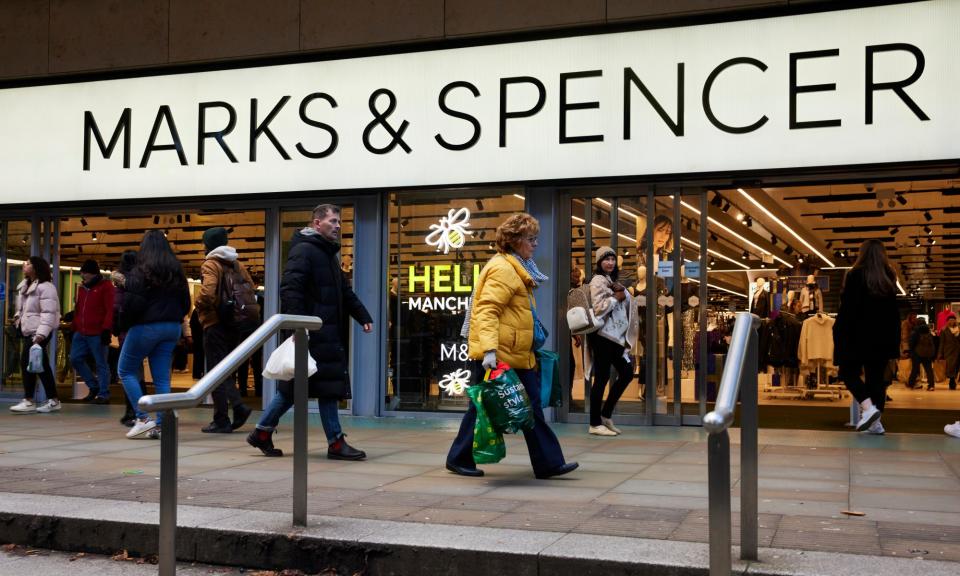Marks & Spencer boss hails ‘growth story’ as annual profits rise 41%

The boss of Marks & Spencer says he is hopeful of a “growth story for years to come” after the revitalised retailer won over 1 million more shoppers to boost profits by 41%.
Stuart Machin, the chief executive, said it was “the beginnings of a new M&S” and there was “wind in our sails and confidence that our plan is working” as pre-tax profits rose to £672.5m in the year to 30 March.
Sales rose 9.4% to £13bn on the back of an 11.3% rise in grocery sales at established stores. The increase was not just a result of inflation, with the volume of goods sold up 5% after the group invested £60m in keeping prices down.
Machin said the retailer, which has 240 full-line stores and 325 food outlets, was winning over a “broad church” of new customers. More under-30s are buying its lingerie than ever before, taking its market share in that product category to a new high of 38%.
Shares in the group rose nearly 6% on Wednesday morning as it announced its first dividend payment to shareholders since 2019, and Machin said M&S was in “the best financial health it’s been in decades” with debts reduced.
He said the company was now aiming for £100m in extra cost cuts by 2028 as it improves efficiency by, for example, working with fewer clothing suppliers and sharpening up the way goods are delivered so that less work is required behind the scenes.
The leap in profits came after £180m of cost cuts, including keeping the number of staff steady in food stores despite higher sales and lowering the cost of delivering food to stores after buying its distribution partner Gist. It has also ditched selling furniture that requires two-person delivery.
M&S said it was bolstering its five-year plan for cost cuts to £500m by 2028 with increases in staff pay offset by “structural cost reductions and other efficiencies” – which the company says relates to more efficient deliveries to free up staff to work with customers, rather than job cuts. Other cost inflation is largely expected be offset by reduced energy costs.
Machin said M&S had increased its market share in clothing and homewares and was “confident we will make further progress”, in a bullish prediction for the year ahead.
The upmarket grocer said it had benefited from a shift towards eating at home rather than at restaurants, with sales of its “dine in” offer up by more than 40%, while shoppers also spent 34% more on its lowest price Remarksable Value range.
Clothing and home sales increased 5.3%, helped by a 15% rise in sales of holiday wear such as swimsuits, while sales of its more expensive Autograph range for men rose 15%. Machin said M&S had tried to keep clothing prices steady and would do so again in the year ahead after sales of basics including denim and knitwear rose by more than 10%.
He said the group did not plan to introduce special discounts for its Sparks loyalty card holders, as done by major chains including Tesco and Sainsbury’s, as the group “didn’t want to get into tricksy prices”. He said short-term price cuts were “forcing you to buy something you don’t really want”.
M&S’s share of losses at Ocado Retail, its online grocery shopping joint venture, widened to £37.3m, from £29.5m, and M&S reiterated that it did not expect to have to pay a final instalment for its share in the business, which was once expected to be £191m.
Sales at M&S’s international stores slid by 1% at constant currency rates to £719m and Machin said it was now “resetting priorities” to step up progress.
Clive Black, a retail analyst at M&S’s broker Shore Capital, said the retailer had “materially beaten market expectations” and he had upgraded his expectations for the year ahead by about 12%.
The group plans to open nine new food stores in the year ahead, up from eight last year, and up to four full-line clothing and home stores, down from six last year, when it also closed seven and relocated five stores.

 Yahoo Finance
Yahoo Finance 